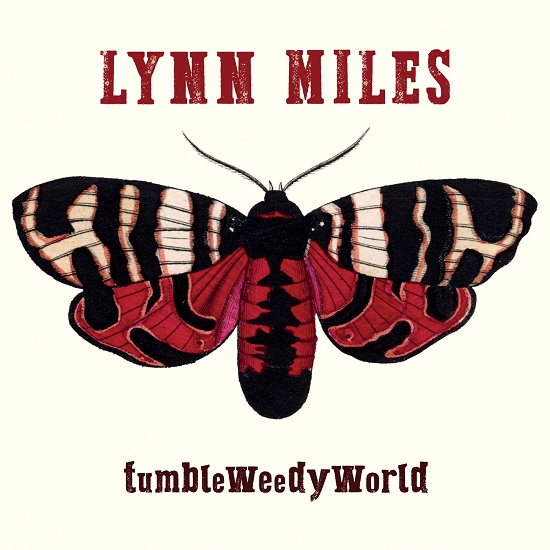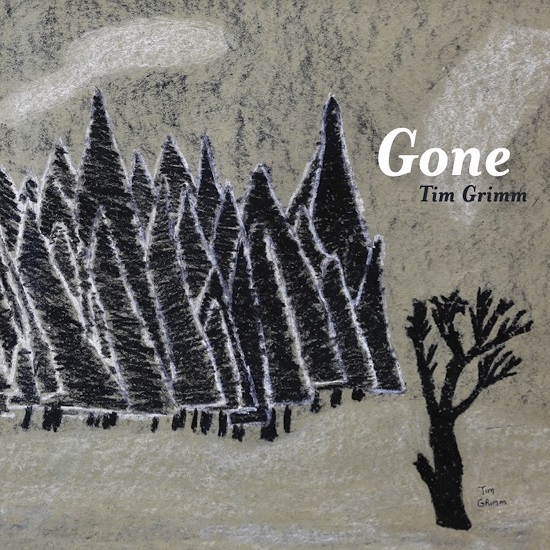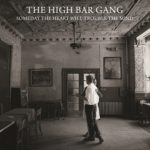
So what’s ‘TumbleWeedyWorld’ about then? Basically it’s about ten songs crafted by a superb songwriter, with musical arrangements that enhance the songs without submerging them and delivered in a beautifully clear fluty voice by Lynn Miles. But I suspect you’re expecting about another three hundred words before I put this one to bed.
With a back catalogue of fifteen albums, a collection of over nine hundred songs, a host of awards and covers by many artists, Lynn has deservedly been a fixture on the Canadian circuit for many years. ‘TumbleWeedyWorld’ is exactly the kind of album you would expect from someone with that pedigree.
The songs are so good that the album doesn’t need a huge production to make them work. The backbone of the arrangements is a traditional string band line-up of upright bass, fiddle, guitar and dobro. Add the exquisite harmonies and you have everything you need for an album of high lonesome-tinged country. In line with the minimalism of the arrangements, the album doesn’t feature a lot of solos, it’s much more about creating interesting textures. There are plenty of instrumental fills from the various players, but the only real solos are the laid-back banjo and mandolin efforts on ‘Hide Your Heart’ and the guitar solo on the rousing, uptempo ‘All Bitter Never Sweet’ which is a nod in the direction of Johnny Cash and June Carter’s ‘Jackson’. That particular couple also make an appearance earlier on the album.
It’s an album of sad songs which somehow manages to end on an optimistic note in the love song ‘Gold in the Middle’ with its effortless vocal and stripped-back arrangement emphasising the purity of the message. The remaining nine songs, with the exception of the relatively positive ‘Palomino’, are explorations of the ways that relationships can fail or the ways we can be hurt. If you want a couple of examples of Lynn’s mastery as a wordsmith, there are two songs that are absolutely packed with poetic imagery.
The opener, ‘Night Owl’, starts from the same situation as Oliver J Leiber’s Paula Abdul song ‘Opposites Attract’ before grim reality kicks in with the realisation that this relationship would never work. The heart-breaking ‘Johnny Without June’ explores the reality of being the one left behind after a long relationship is ended by death. It’s delivered in almost a Nashville style and, just in case you didn’t get the song’s references, it’s all made clear by two references to Johnny Cash songs in the song’s final four lines.
‘TumbleWeedyWorld’ is a polished piece of work from a great songwriter. Lynn Miles has taken a cold, hard look at the things that can go wrong for us in a screwed-up world and expressed them in words and music. However, she leaves room for optimism (or dodging the tumbleweeds) with ‘Palomino’ and the closing song ‘Gold in the Middle’. If you’re a fan of country in any of its many forms, you should give this gem of an album a listen.
‘TumbleWeedyWorld’ is out now on True North Records (TND802).
Here’s the lyric video for ‘Johnny Without June’:

Tim Grimm released the single “Gone” at about the time of the American election last year as the third of a trilogy of singles about the Trump era. It could have been a very angry song, but Tim pitched it as a regretful look at the hypocrisy and viciousness given free rein by the contentious president number forty-five. Now it’s one of the pillars of an album that’s suffused with loss and leavened by a sense of rebirth and renewal.
The one exception to this mood is the (presumably) autobiographical “Cadillac Hearse” which rattles along in the style of vintage Johnny Cash with acoustic guitar and mandolin fills and walking bass and tells an uplifting coming of age story set in rural community in America in the sixties where the hearse doubles up as an ambulance. It’s the bit of rollicking fun that throws the rest of the album into a stark contrast.
The album opens and closes with a full arrangement and a stripped-back version of the song “A Dream”, which establishes and then reinforces the theme of the album. “A Dream” is a poignant, elegiac story of loss, linked to the song “Laurel Pearl” by the lyrical reference to ‘the girl with the funny name’. “Laurel Pearl” moves on from a dream evocation of loss to a genuine story of a life ended too soon. This isn’t the only link between songs on the album; “Joseph Cross”, the story of the death of a Native American man with an incredible history, was written by Eric Taylor, one of the three songwriters mentioned in “Dreaming of King Lear”, who died during the pandemic.
The other two songwriters Tim pays tribute to in “Dreaming of King Lear” are Michael Smith and David Olney (who quoted the ‘blasted heath’ speech from “King Lear” on his final album “Whispers and Sighs”). The opening line of the song also echoes the opening of Jackson Browne’s “Before the Deluge”. “Laurel Pearl” is the heartbreaking story of the death of a child, which feels strongly linked to “A Dream”. The message isn’t entirely sombre; the line ‘you’re part of every living thing’ hints at renewal and the happy memories live on. The sense of peace and renewal reverberating from the previous song “25 Trees” (where the tree planting represents things that will carry on after us, while books on a shelf represent a history that has already endured) is strengthened. And there’s the obvious link between trees and paper.
“Cadillac Hearse” aside, “Gone” is a very gentle album with delicate folk stylings that allow the lyrics to shine through and the themes of renewal and moving on are enhanced by having the next generation, Connor and Jackson (Tim’s sons), contributing to the album. It was never part of Tim Grimm’s plan to release an album in 2021, but “Gone” is timely. There’s regret and a bit of anger for the events of 2020, but also a calm realisation that we must move on and create our future. That’s a message I’ll happily endorse.
“Gone” is released in Europe on Friday September 10th.
Here’s the video from “Dreaming of King Lear”:

Photo by Jen Squires
We reviewed Stephen Fearing’s thirteenth album, “The Unconquerable Past” earlier this year, during the period when live music was still happening and COVID was a tiny cloud on the horizon. It feels like we were in a different universe. Anyway, we loved the album and we were really pleased when Stephen agreed to make a contribution to this year’s High Fives feature at the end of a difficult year for anyone involved in the world of music. Like many musicians, Stephen has retained his optimism and belief that however bad things get, music can always help you to get through the day.
“Life is What Happens To You While You’re Busy Making Other Plans.” — John Lennon
I’ll be honest and say that I am STILL struggling to fully “come to grips” with this year. As ever, there are so many things to be grateful for amidst the tatter of what was “supposed to be”, and I’m happy to report that the glass is definitely half-full and even possibly topping itself back up (Biden/Harris and news of “The Vaccine” seem to have arrived at the party together).
However, my high fives will all go to music, the touchstone that has always been my bedrock and this insane year is no different. 2020 – Music saved my soul.
 1 Nashville – “ On The Road Again ” -Willie Nelson. The year started out with a bang as I travelled south to Nashville to appear with my hairy brethren – Blackie and The Rodeo Kings – at The Bluebird Cafe and The Grand Ole Opry (at The Ryman ).
1 Nashville – “ On The Road Again ” -Willie Nelson. The year started out with a bang as I travelled south to Nashville to appear with my hairy brethren – Blackie and The Rodeo Kings – at The Bluebird Cafe and The Grand Ole Opry (at The Ryman ).
Coincidentally, I was working my way through Ken Burns “Country Music” documentary which just made walking out onto that stage even more magical and surreal. This was a hell of a way to start what was shaping up to be my busiest year of music making, with a solo release (The Unconquerable Past) and Blackie’s new Warner Bros. 25th anniversary release ( “King of This Town” ). I was looking to log some serious air miles and play my face off.
 2 Europe – “On The Road Again ” -Willie Nelson.
2 Europe – “On The Road Again ” -Willie Nelson.
By the middle of February I was in Europe finishing up some solo dates and a series of much-anticipated shows with my Danish pals – The Sentimentals. I met these fantastic humans two years ago through our mutual friend Jonathan Byrd who generously shared their contact with me when I enquired about his “Scandinavian connection”. What started in 2018 with some shows in Denmark grew into this 2020 tour with performances in Denmark, The UK, Holland and Germany. Here we are backstage at Meneer Frits in Eindhoven – The “greenroom” is off the kitchen… One of my projects this winter is to mix and edit the show we filmed and recorded that night. Stay tuned.
 3 “No one lives forever Who would want to
3 “No one lives forever Who would want to
But you’re too soon gone
Too soon gone” – Jules Shear and Stan Szelest
My Mother warned me that there would come a day when I would see my heroes begin to “shuffle off this mortal coil”. The 2020 list of those who have left us is staggering – Vera Lynn, David Olney (who doesn’t want to go out like David Olney?), Lyle Mays, Little Richard, Helen Reddy, Charlie Daniels, Bonnie Pointer, Toots Hibbert, Jerry Jeff Walker, McCoy Tyner, Eddie Van Halen, Justin Townes Earl, John Prine… The loss is poignant but the point is just how much each of these great artists left behind for us to cherish.
Early in March when things were just starting fall apart, I went for a drive with my daughter (16) and had the pleasure of introducing her to the music of Bill Withers – she is surrounded by music and had heard some of his classic tunes but hadn’t fully joined the dots so to speak. Watching her really feel the pocket on tunes like “Who Is He (And What Is He To You)” or “Keep On Using Me” was a great feeling. Bill Withers’ has always been like comfort food to me and as a white-on-white kid living in Ireland, his music taught me a great deal about honesty, compassion and things like how Black Lives Matter. Such a generous spirit – Lean on me, when you’re not strong, I’ll be your friend, I’ll help you carry on…

 4 – “My hands are turning numb But I still gotta strum
4 – “My hands are turning numb But I still gotta strum
My Velvet guitar” – Alejandro Escovedo
2019 was the year that legendary Canadian luthier Linda Manzer presented me with my new Manzer “Cowpoke”, the sister to the guitar I have been playing (almost daily) for the past 30 years. It’s a long story, but way back in 2006, a man named Gerry Hayes (Gerry and I had become pals when he came to gigs in the Ottawa Valley region) passed away suddenly and left me his beloved ’79 Manzer. If you want to know the whole story, watch my conversation with Linda entitled “30 Year Cowpoke” on YouTube, but to cut to the chase, that gift from Gerry started the ball rolling on a gorgeous new instrument which I received late last year. A new hand-built guitar requires significant break-in time and the silver lining for me in my “lockdown” has been to play the Cowpoke daily and hear how slowly but surely, the new sister surpasses the old. #bittersweet

 5 “I’m stuck in Folsom Prison
5 “I’m stuck in Folsom Prison
And time keeps draggin’ on” – Johnny Cash
OK, I know I’m about as lucky as one can get in these pandemic- lockdown times. I live in “The Garden City,” on an island in The Pacific, in a country where our Govt. has seen fit to provide supplementary income for almost all of us… so I’ve really got nothing to complain about and I do my best not to. Instead, I dug into live-streaming early on but am now devoting my time to sharpening my skills, writing, playing, taking online courses for recording + video-editing software and trying to knock things off the endless list of fix-or-build DIY.
Around our old queen of a house (oh and I really got into the sourdough bread thing). I know how lucky I am and though I struggle with bouts of depression, it’s mostly a passing thing. However, so many in my industry are in dire straits, struggling to keep their heads above water. I am most grateful for my audience and feel privileged to be a part of this great music biz family… mostly I just want to help any way I can. So earlier this year, I created a video with some pals to try and funnel some much needed $$ to an organization dedicated to helping Canadians in the biz. I urge you to go find a similar group in your neck of the woods and see what you can do to help.
For it won’t be long ’til I’m gonna need Somebody to lean on.
![imgID72704821.jpg.gallery[1]](http://musicriot.co.uk/wp-content/uploads/2017/02/imgID72704821.jpg.gallery1-150x123.jpg) ‘Well, I said hello to the spirit of 1956,
‘Well, I said hello to the spirit of 1956,
Who was stationed in the bushes next to ’57….’
Thus sang Jonathan Richman on one of the dozen best songs ever recorded, “Roadrunner”.
I encountered the same spirits on a soggy Thursday night in Leek. It’s not what you expect, really and I would have appreciated fair warning but there it is.
A modest but politely enthusiastic audience was more a reflection of the night rather than ‘the turn’. Leek, one of the highest towns in England – ‘Queen of the Moorlands’, baby – was sloshing about in the remains of the tropical storm which had brought a well-morphed spirit of the Caribbean many miles away from source. This exotic and fantastical weather ‘bomb’ was well named by the time it reached these climes.
Doris. Queen of the wet and windy.
So one for the hardy, very local or true believers.
First up, support from a local musician and leading light in the Leek Blues Fest – end of last week in September 2017 for those of you young enough to believe in the idea of forward planning – Mike Gledhill, an affable singer-songwriter who played an amiable bunch of self-penned songs, one of which he entertainingly claimed he wrote with J.J. Cale….”he just doesn’t know it yet…!” all of which amounted to a pleasant enough starter-upper.
John Lewis is, in his solo incarnation, a revelation from the second he hits the strings. Within the first four songs it is pretty obvious we’re in the presence of something a bit special here. His repertoire wanders with total comfort between 1956 rockabilly skeletons, Hank Williams-esque country painfests, straight-ahead four on the floor R’n’B – tinged rock ‘n’ roll that Chuck Berry made his own, and the prehistoric pop sensibilities of Buddy Holly. How does he manage this?
Well, for a start, this guy has A Voice. And it’s usually the voice which lets down a perfectly acceptable ‘Americana’ (hate the term – but bear with me) act, especially the blues. But this guy has got the whole thing going on. I find it incredible that one bloke’s voice can capture the essence of the pained ache of the aforementioned Hank Williams (done badly it just sounds like mawkish sentimentality – and John Lewis doesn’t appear to do mawkish sentimentality), the tremulous, vulnerable majesty of Roy Orbison, the mean, gritty swagger of some of the other Sun-era originals like Sonny Burgess, Charlie Feathers et al, and the popped-up sweetness of Buddy and yes, at one point, Elvis and of course, Johnny Cash. Not only that, he is positively expert on a range of guitars that look like they really ought to be nailed to the wall in a museum in Nashville or used as agricultural instruments.
Here is a man who is on top of his game, big style. You don’t have the likes of Imelda May helping out on his beautiful celebration of dadness, “Waltz Around the Kitchen”, or The Jets providing back-up on some of his recordings without knowing your chops. What I find similarly astonishing is the authenticity which having a ‘stamping board’ – which looks like a heavily-modified pallet – as your rhythm section. And to keep that going with metronome precision throughout a set which requires a variety of pace changes mid-song can’t be easy, not to mention physically exhausting.
What is it about the Welsh? Why do they produce such brilliant rock ‘n’ rollers? Crazy Cavan and the Rhythm Rockers; the much-maligned Shakin’ Stevens; Geraint Watkins; Ricky Valance (first Welshman to have a UK number 1 hit; ask your grandma.) Even Sir Thomas The Jones started out with beat-group derivatives of old-school r and r. And John Lewis sits fairly and squarely in the middle of this tradition. Already. And you feel there’s still plenty to come.
Perhaps the best compliment you can pay an artist who features a number of ‘covers’ in their set is that the originals are not fillers you sit through politely before he chucks in a crackling, impatient “Help Me” or an incendiary “Baby Please Don’t Go”. By focussing on the fundamentals, family relationships (“Waltz”) paying the bills or not (“Money Troubles”) or social exclusion (“Not Quite the Not”) his own stuff sits in perfect context with a whole range of classics which span early skiffle, work songs, blues and country. Modern sensibilities, mark you; “Money Troubles” is a beaut, naming the beast in a direct and modern setting. I mean, if he was writing ‘baby left me and mah mule got lame, lost mah money in a poker game’ you’d wonder quite what the point was. So he doesn’t.
And that quite stunning voice enables him to interpret an old and well-worn song with vision and flexibility. I mean, “Always on My Mind” sung by Elvis always sounds to me like ‘I may not be perfect but regarding our relationship I’m always Elvis Presley.’ Sung by Willie Nelson, it sounds like ‘I’m nowhere near perfect but regarding our relationship, this is the about the best I can manage.’ Here is an interpreter of other people’s songs who thinks about what they mean to him, not just his own material, and that isn’t necessarily a given.
Note to self; go and see The Real John Lewis, as the microphone stand proclaims, as a trio and see how that changes the dynamic of things. I’d imagine that freed from having to be his own personalised rhythm section there’d be some real pyrotechnics then. And also, must go see him in an over-full, sweaty cave somewhere filled with the drunk and the raucous rather than the sparsely-populated but admittedly lovely high-ceilinged Victoriana of the Foxlowe Centre.
I stop mid-gush to voice two slight concerns. Firstly, regards old rockabilly and rock n roll, (I flatly refuse to use the term Americana as I hate it with a vengeance) virtually the entire world is looking in a direction away from the original source of music as we know it at the moment. How is this phenomenal talent to break out of the limitations of the genre? And secondly, what exactly IS the genre? And DON’T say Americana, I will not be held responsible for my actions. Sooner or later, a ‘breakthrough’ airplay track may well compel The Real John Lewis to define himself a little more precisely than his talent would probably feel comfortable with. At that point The Real John Lewis – or a version of – might be forced to stand up. (At which point the rhythm section will fall silent, ‘cos you can’t do the stomp rhythm thing unless you’re sitting down.)
But neither of these things are the artist’s problem and neither are they particularly within his control, either.
And the latter might be a nice problem to have. It would be no more or less than he deserves.
New acoustic album “His Other Side” comes out on February 26th, I’m told. Website www.therealjohnlewis.com
 String bands, bluegrass generally; it’s not for everyone and I guess most bands making music in this genre today must be trying to attract a few new listeners, but how do you do it? You can try playing traditional tunes and be better than anyone else, but that’s not likely to bust you out of the genre. You can write new songs in the bluegrass idiom, but that’s risky unless they’re very good. The third way is to cover familiar songs in the string band style, and that’s the way The High Bar Gang have gone with their previous album of gospel songs and this album of heartbreak and death country songs. And they did one more revolutionary thing; they recorded the album in stereo, as opposed to using the traditional one–mic technique.
String bands, bluegrass generally; it’s not for everyone and I guess most bands making music in this genre today must be trying to attract a few new listeners, but how do you do it? You can try playing traditional tunes and be better than anyone else, but that’s not likely to bust you out of the genre. You can write new songs in the bluegrass idiom, but that’s risky unless they’re very good. The third way is to cover familiar songs in the string band style, and that’s the way The High Bar Gang have gone with their previous album of gospel songs and this album of heartbreak and death country songs. And they did one more revolutionary thing; they recorded the album in stereo, as opposed to using the traditional one–mic technique.
Despite a few lovely guitar solos, particularly on the opener, Dolly Parton’s “Silver Dagger” and the penultimate “Rock Salt and Nails”, the sound of The High Bar Gang is built on a solid basis of ensemble playing, the interplay between bass and guitar and the more percussive mandolin and banjo creating the rhythms that drive the songs underpinning a rich and varied series of textures and melodic settings created by seven players with various combinations of guitar, banjo, mandolin, fiddle and upright bass. There’s even some time signature variation, with almost half of the songs in ¾ time.
And then there’s the voices, working together in all sorts of combinations; two-part and three-part harmonies featuring in “How Many Times Have you Broken my Heart?” and “She’s More To Be Pitied” (sounding like a reply to the Arlie Carter and William Warren classic “Wild Side of Life”) and the male/female duet combination of “Branded Wherever I Go”. They all have that seemingly effortless lustre that only happens when a true gift is polished to perfection.
If you look at this as an experiment in adapting songs to a string band style, it’s a complete success; it should win over a few more fans to a genre that’s almost a polar opposite of everything we hear on mainstream radio. There are lovely interpretations of classic songs by Dolly Parton, Earl Scruggs, Roy Acuff, Hank Williams and Johnny Cash, all accented with perfect harmonies and melancholy fiddle fills. Who knows, it may even help them earn a well-deserved breakthrough to a wider audience.
“Someday the Heart Will Trouble the Mind” is out on August 19th on True North Records (TND622).
 How long is it since you heard a good song that was funny, or even a funny song that was good? One that wasn’t just whimsical and that you could maybe bear to listen to a second time around? There was a period in the seventies when Loudon Wainwright III, Warren Zevon and the brilliant Shel Silverstein turned out some hilarious songs alongside the serious stuff, but what’s happened since? Well, here’s the good news, it looks like Scott Cook can carry on the tradition. He’s a gifted songwriter, fizzing with boldness and ingenuity, writing about the environment, responsibility, commitment and the world stubbornly refusing to end according to anyone’s timetable. Scott describes “Go Long” as ‘a bunch of silly songs’ that were recorded live in the studio with a few overdubs and corrections later, giving it a fresh and spontaneous feel that works perfectly for the songs.
How long is it since you heard a good song that was funny, or even a funny song that was good? One that wasn’t just whimsical and that you could maybe bear to listen to a second time around? There was a period in the seventies when Loudon Wainwright III, Warren Zevon and the brilliant Shel Silverstein turned out some hilarious songs alongside the serious stuff, but what’s happened since? Well, here’s the good news, it looks like Scott Cook can carry on the tradition. He’s a gifted songwriter, fizzing with boldness and ingenuity, writing about the environment, responsibility, commitment and the world stubbornly refusing to end according to anyone’s timetable. Scott describes “Go Long” as ‘a bunch of silly songs’ that were recorded live in the studio with a few overdubs and corrections later, giving it a fresh and spontaneous feel that works perfectly for the songs.
There are some ‘serious’ songs on the album (“Sweet Maddie Spawton”, “Come This Far”, “That’s Life (Loving You Right Back)” and “While the Party’s Still Going) but the remainder often look at serious subjects through a humorous filter. “Talkin’ Anthropocalypse Blues” typifies this, with a breakneck run through a few inaccurate Armageddon predictions before bringing the song back to the need to take responsibility for our planet, rather than waiting for someone to do it for us. It rattles along like Johnny Cash’s “A Boy Named Sue” (written by Shel Silverstein) with barely a chance to draw breath as the failed apocalypse predictions are serially skewered. “I Live Down Here” sounds like a children’s singalong, with a simple structure, lots of repeated lines and opportunities for audience participation but with a powerful environmental message permeating the nonsense verses.
And some are just funny. The album opens with the sound of a ringpull and the line ‘Judging by the angle of the sun, I’d say it’s beer o’clock” as the band rambunctiously stomp through “Long Weekends Theme”, while “Will the Circle be Unbroken” pokes fun at songs that are past their sing by date; both songs made me laugh out loud on the very first listen, even on a very bad day. “Lifer for a Wifer”, about the impossibility of relationships on the road, is packed with great lines, including ‘And if she can diddle the big bass fiddle, I’ll be wrapped around her strings’.
The sleeve notes suggest that this is a frivolous departure from the main themes of Scott Cook’s songwriting, and while it’s true that there’s plenty of fun on offer, more often than not there’s a serious message lurking. This is an album that will make you smile, probably make you laugh out loud, and should make you think. You don’t often find one of those.
“Go Long” is released on Friday July 8th on Groove Revival (GRP 007).
The sleeve notes also have lyrics, guitar chords and helpful hints from Scott about how he actually played the songs.
 So; first gig of the year and let’s see what’s changed and what hasn’t. Well, the problems with transport haven’t changed; because of engineering work and a late start by the headliners, Southbound, I only caught the first three songs of what was shaping up to be a storming set of funky Southern rock and boogie. Sorry guys, I’ll make up for it next time. The other thing that hasn’t changed is people talking over artists at gigs. Why do you pay to see bands, completely ignore them and spend all night having your own conversations? I could ask why the sound engineer doesn’t bump the volume up a bit as well.
So; first gig of the year and let’s see what’s changed and what hasn’t. Well, the problems with transport haven’t changed; because of engineering work and a late start by the headliners, Southbound, I only caught the first three songs of what was shaping up to be a storming set of funky Southern rock and boogie. Sorry guys, I’ll make up for it next time. The other thing that hasn’t changed is people talking over artists at gigs. Why do you pay to see bands, completely ignore them and spend all night having your own conversations? I could ask why the sound engineer doesn’t bump the volume up a bit as well.
So with two acoustic singer-songwriters as the first acts on stage, things didn’t look too good. Hannah Jackson coped pretty well, mainly because of her incredibly powerful voice with jazz and soul inflexions, playing a set which combined her own songs with some covers, including a great version of The Killers’ “All these Things that I‘ve Done” and the Johnny Cash classic, “Folsom Prison Blues”. I think we might hear more from Hannah. Second up, Saraswati, wasn’t quite so lucky. Her delicate songs, including her debut single “Bad Habits”, and her delicate, breathy voice (maybe a hint of Sade there) were all but drowned out by the braying crowd. At times like this, I’m grateful we have strict gun laws.
No such problems for The Likks, though. Their brand of noisy riff-based rock, funky melodic basslines (a hint of The Black Crowes) and Jordan Jay Kennedy’s big voice didn’t stop the talking, but it made it really difficult to carry on a conversation. Within each song there were tempo changes and rhythmic shifts which added variety but also a bit of disorientation. You certainly didn’t know what was coming next; raw but interesting. And so, on to the reason I was out in south-west London on a freezing winter night.
It’s been a bit of a turbulent year for Little Devils (“The Storm Inside”, indeed); following a cabinet reshuffle, they now have a new singer and guitar player, Magda Supel and Chris Walker respectively. I never need an excuse to go and watch Little Devils, but I particularly wanted to see how the new line-up was gelling. It’s all good news; despite having limited time to rework the songs for the Devils Nouveaux, the band sounded great. The rhythm section of Sara and Graeme powered the band along while Magda sung with soul and power (despite being really ill) and Chris looked and sounded like he was having the time of his life; he’s a quality guitar player. They powered through a half-hour set that included Devils favourites “Pay the Waiter”, “My Perfect You”, “Good Times” and Graeme’s growled version of “A Long Time Ago”. The newest diabolical incarnation sounds absolutely fine to me.
And, apart from a few songs from Southbound, that was the end of my first gig of the year. Four stars for the performers, one star for most of the audience.
![220px-Ssilverstein[1]](http://musicriot.co.uk/wp-content/uploads/2014/08/220px-Ssilverstein1-211x300.jpg) How did I discover Shel Silverstein? Easy, I bought a copy of the Dr Hook and the Medicine Show album “The Ballad of Lucy Jordon” (a contractual obligation “greatest hits” package put together by CBS before the band departed to Capitol and commercial success). As an introduction to early ‘70s Dr Hook, it’s a belter. Released in 1975, it was obviously a vinyl album; you remember those, don’t you? I bought it on the strength of the chart hit “Sylvia’s Mother”, but that wasn’t even close to being the best song on the album; that’s at the end of the album and the end of the next paragraph.
How did I discover Shel Silverstein? Easy, I bought a copy of the Dr Hook and the Medicine Show album “The Ballad of Lucy Jordon” (a contractual obligation “greatest hits” package put together by CBS before the band departed to Capitol and commercial success). As an introduction to early ‘70s Dr Hook, it’s a belter. Released in 1975, it was obviously a vinyl album; you remember those, don’t you? I bought it on the strength of the chart hit “Sylvia’s Mother”, but that wasn’t even close to being the best song on the album; that’s at the end of the album and the end of the next paragraph.
A quick look at the album sleeve showed that fifteen of the sixteen songs were written by someone called Shel Silverstein, who wasn’t even a member of the band, and they were a fascinating collection of songs, ranging from the country pastiche of “The Wonderful Soup Stone” through the Rabelaisian comedy of “(Freaking at) the Freakers’ Ball” and “Roland the Roadie and Gertrude the Groupie” to the superb ( and much-covered) story of a suburban breakdown, “The Ballad of Lucy Jordon”. If you don’t listen to anything else picked out in this piece, you really should listen to the Marianne Faithfull version of this song.
I know this is a nostalgia piece, but there are a lot of things that weren’t better in the old days. In the 21st century, you can find out almost everything about a group or artist within seconds; you can get a biography, you can listen to their material (released and unreleased), you can probably get a message to them directly and they might even reply. In the mid-to-late 70s, you had NME, Sounds, Melody Maker, John Peel and some independent record shops to let you know what was going on. Although I was only really interested his music, I discovered that there was much more to Shel Silverstein than songs; he was also a gifted cartoonist, poet, screenwriter author of childrens’ books.
Eventually, I managed to track down a couple of imported albums (“Songs and Stories” from 1978 and “The Great Conch Train Robbery” from 1980). While the albums didn’t have the polish of the Dr Hook material, they covered a lot of the same territory and gave the impression that once Shel had an idea he had to get it down and move on quickly because there were ten more ideas banging on the door behind it. I loved “Songs and Stories”, from the sheer silliness of “Goodnight Little House Plant”, “Someone Ate the Baby” and “Never Bite a Married Woman on the Thigh” through “The Father of a Boy Named Sue” (he also wrote “A Boy Named Sue”) to the epic stoner poem “The Smoke-Off” and the ode to cop-outs, “They Held Me Down”. It had all the manic energy of a live performance by Robin Williams, who was just emerging as a stand-up at the time.
Shel Silverstein was that rare example of genuine Renaissance Man; he had gifts ranging across the field of creative arts, but it was as a songwriter (and ramshackle, shambolic performer) that I love his work. His serious work, such as “The Ballad of Lucy Jordon” was superb, but he also wrote comedy songs that were actually funny ( I still laugh out loud at the lines: ‘Everybody ballin’ in batches, pyromaniacs strikin’ matches’ from “Freakin’ at the Freakers’ Ball”) and you could bear to listen to more than once. It helped that he drew a lot of his humour from the fringes of society and legality, which gave it an extra frisson to anyone looking in to that world from the outside.
You rarely hear Shel Silverstein’s name mentioned these days, which is a shame, but he has left a huge legacy in print and in music. If you’re still not convinced, just ask yourself what these songs have in common: “A Boy Named Sue”, “Queen of the Silver Dollar”, Sylvia’s Mother”, “25 Minutes to Go” and “Daddy What If”? Yep, all written by Shel Silverstein. Most songwriters would kill to have written any one of those songs, and that’s before you even get to “The Cover of the Rolling Stone” and the sadly under-rated “Last Mornin’”. He’ll make you laugh and he’ll make you cry, but he’ll never bore you.
Old people who used to watch the satirical comedy show ‘Not the Nine O’Clock News’ hundreds of years ago (me) may remember that they spoofed the idea of the grandiose eighties music video accompanying the limp, underwhelming song. ‘Nice Video, Shame about The Song’ is still very much applicable in 2013 too but in the case of London based Cash + David and their debut single “Funn” they both carry very much equal weight. An arresting visual that includes drag king caricatures of David Bowie and Johnny Cash duelling it out in an empty studio which is set to a razor sharp, liquid cool hybrid of electronics and guitars. The vocals, presumably female, are pitched to confuse like a more accessible Planningtorock, no bad thing, but will Cash + David change identity with each record? If the music maintains the quality and panache demonstrated here, who cares?
Released on March 10 2014. Available to pre-order on iTunes.
 We asked one of our favourite singer-songwriters, Dean Owens, what he was looking forward to hearing (or reading or seeing) in 2014, and he came up with some very interesting recommendations for us. Dean’s comments are in bold type.
We asked one of our favourite singer-songwriters, Dean Owens, what he was looking forward to hearing (or reading or seeing) in 2014, and he came up with some very interesting recommendations for us. Dean’s comments are in bold type.
First on the list was the new Joel and Ethan Coen film, “Inside Llewyn Davies”. It’s the story of a folk singer trying to get a break in the Greenwich Village folk scene in 1961 and features contributions from the Coens’ long-term collaborator, T-Bone Burnett and also Marcus Mumford. As Dean says: I love the period in New York history it’s set in and I like pretty much like everything the Coen Brothers have done.
Next up was the new novel, “The Free”, by author (and singer and songwriter with alt-country band, Richmond Fontaine), Willy Vlautin. This, his fourth novel, is the story of the intersecting lives of three people looking for meaning in difficult social circumstances. Over to you, Dean: The new Willy Vlautin book should be good. He’s a great writer. I’m guessing there may be a new Richmond Fontaine album on the horizon too.
Very curious to hear the lost Johnny Cash album, “Out among the Stars”. Should be some gems on that.” The twelve tracks on the album were recorded in 1981 and 1984 and have been in the Columbia vaults ever since; they aren’t demos out-takes or alternative versions, they’re the real deal and they include duets with June Carter Cash. They were uncovered by Legacy Recordings and John Carter Cash.
I’m very much looking forward to seeing the first album I’ve produced for another artist being released; it’s by Ags Connolly, it’s called “How About Now” and it’s out in February on Drumfire Records. In November, we reviewed a great gig by Dean and Ags and we’ll be reviewing the album as soon as I can get my hands on a copy.
Deer Lake (who I sing with) should be releasing our debut album this year. I’m excited about that. We’ll also be doing a lot more live work this year. Dean’s been singing with Deer Lake for some time now, alongside former Annie Christian frontman, Larry Lean and the album will be out some this year. We’ll keep you posted.
I’ve got a few solo projects up my sleeve this year. Be great to get a new record out and do some touring. So, it looks like Dean’s got a pretty busy year ahead of him in 2014, both solo and with Deer Lake. We’ll be trying to keep up with him.


